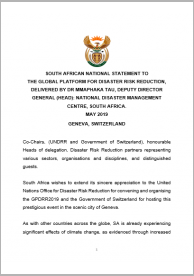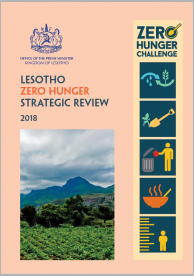
An Official Statement made by Mr. Mmaphaka Tau, at the sixth session of the Global Platform for Disaster Risk Reduction, May 2019.
The following is a list of all conten labeled as "Governance"

An Official Statement made by Mr. Mmaphaka Tau, at the sixth session of the Global Platform for Disaster Risk Reduction, May 2019.

This Coastal Management Plan consolidates risk information and provides a framework for its use for coastal management, adaptation, and risk management. It aims to help maintain and protect the coastal zone to reduce coastal risk, support healthy ecosystems, and enable sustainable coastal economic development.

The main objective was to analyse food and nutrition security, and vulnerability of the population of Lesotho in 2019/2020 consumption year. Provide policy makers, government and other stakeholders with information for decision making and development programming.

An Act to provide for the establishment of the Disaster Risk Management Division for the effective management of disaster through a comprehensive and integrated all-hazard approach and for matters connected therewith or incidental thereto.

In order to address the challenges that inhibit the country’s potential to achieving zero hunger by 2030, the Government commissioned the Lesotho Zero Hunger Strategic Review (LZHSR) report.

The Seychelles Sustainable Development Strategy (SSDS) 2012-2020 is an approved national instrument which incorporates national priorities for sustainable development and lays out a roadmap for the implementation of those priorities.

The Seychelles Sustainable Development Strategy (SSDS) 2012-2020 is an approved national instrument which incorporates national priorities for sustainable development and lays out a roadmap for the implementation of those priorities.

This paper provides an overview of what climate change will mean to subsistence and smallholder farmers in Lesotho, and how the capacity for climate change adaptation in agriculture can be strengthened, focusing on selected areas of crops, livestock and forest-based livelihood systems, to stabilize and improve yields.

The NCCS will provide a coherent and consolidated response to climate change. This strategic document will remain a “working” document intended to be updated and revised on an ongoing basis in response to new challenges and opportunities.

The purpose of the Regional Indicative Strategic Development Plan is to deepen regional integration in SADC. It provides SADC Member States with a consistent and comprehensive programme of long-term economic and social policies. It also provides the Secretariat and other SADC institutions with a clear view of SADC's approved economic and social policies and priorities.